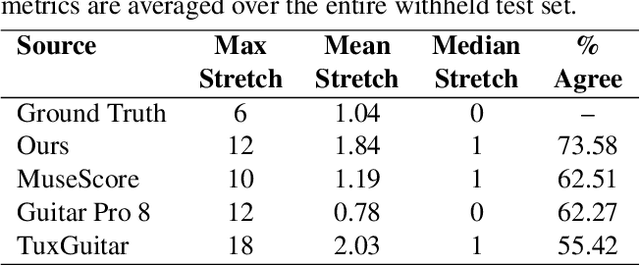MIDI-to-Tab: Guitar Tablature Inference via Masked Language Modeling
Paper and Code
Aug 09, 2024



Guitar tablatures enrich the structure of traditional music notation by assigning each note to a string and fret of a guitar in a particular tuning, indicating precisely where to play the note on the instrument. The problem of generating tablature from a symbolic music representation involves inferring this string and fret assignment per note across an entire composition or performance. On the guitar, multiple string-fret assignments are possible for most pitches, which leads to a large combinatorial space that prevents exhaustive search approaches. Most modern methods use constraint-based dynamic programming to minimize some cost function (e.g.\ hand position movement). In this work, we introduce a novel deep learning solution to symbolic guitar tablature estimation. We train an encoder-decoder Transformer model in a masked language modeling paradigm to assign notes to strings. The model is first pre-trained on DadaGP, a dataset of over 25K tablatures, and then fine-tuned on a curated set of professionally transcribed guitar performances. Given the subjective nature of assessing tablature quality, we conduct a user study amongst guitarists, wherein we ask participants to rate the playability of multiple versions of tablature for the same four-bar excerpt. The results indicate our system significantly outperforms competing algorithms.
 Add to Chrome
Add to Chrome Add to Firefox
Add to Firefox Add to Edge
Add to Edge